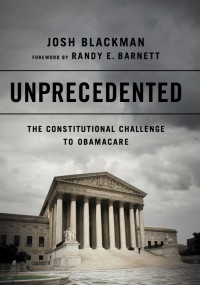Contrary to what we may think now, health care was never the number one issue for then-Candidate Obama in 2008. Ann Althouse unearths a response Obama gave in 2007 to New Hampshire Independents about the number one piece of legislation he wanted to enact during his presidency. His answer?
“I would enact a bold energy policy because I think that we could save so much money, engineer such a resurgence in our economy and solve climate change all at one time. And it would improve our national security posture. So you get a three-fer. It helps our environment, our economy and our national security and it would free up resources over time to deal with what I think is the most important domestic issue which is health care, and I think it would help us strategically on the international stage.”
In order, energy, economy, climate change. And only after those are settled, then health care.
 As I discuss in Unprecedented, even in the general election he did not place health care first.
As I discuss in Unprecedented, even in the general election he did not place health care first.
The next presidential debate, a town hall forum held on October 7, 2008, at Belmont University in Nashville, Tennessee, offered a deeper glimpse into the mechanics of Obamacare. When asked to rank his priorities among health care, energy, and entitlement reform, Senator McCain said,“I think you can work on all three at once.”With respect to health care, McCain said that “everyone is struggling to make sure that they can afford their premiums and that they can have afford- able and available health care.” Obama, by contrast, called health care “priority number two, because that broken health care system is bad not only for families, but it’s making our businesses less competitive.”
Even among the American people, health care was not the number one priority on election day. The economy was.
On November 4, 2008, Barack Obama soundly defeated John Mc- Cain by 365 electoral votes to 173. An election-day poll showed that voters supporting Obama listed health care as their second-highest priority. Now the president had the platform to change the American health care system.
The President’s closest advisers urged him not to focus on health care in his first year in office, but instead to focus on the economy. The President ignored that advice, sought to focus on his legacy.
There was general uneasiness among those in the new administra- tion about the president-elect’s decision to tackle health care right away. Daschle recalled that “Larry Summers, the director of the Na- tional Economic Council, [was] concerned that the president would have his hands full with the biggest economic crisis since the Great Depression.” Summers “asked whether this was really the best time to take on health care, too.” Peter Orszag, the Office of Management and Budget director, “tried to mediate . . . this debate within the president’s inner circle.” In January 2009, Vice President-Elect Biden “spoke at length about why it would be too much to attempt health care reform in the middle of the [financial] crisis.”
In fact, “there were times when it was not clear that the president himself was fully committed to taking on the problem early on,” Daschle remembered. Ultimately, however, in spite of the doubts of Obama’s advisers, it became apparent to Daschle that “the president himself was sure—and that meant health care reform just might succeed after so many years.” After the inauguration, Obama told Daschle, “Tom, health care is the most important thing we will ever do. It will be my legacy. And it is more important to me now than ever before. Don’t ever doubt that.”
It is simply not the case that the 2008 election was a referendum on health care, or even that the voters in 2008 wanted the health care reform the President proposed. In fact, the agenda candidate Obama laid out was very different from the plan President Obama pursued.
Ann, who voted for Obama feels “defrauded.”
Health care is in there, but only after the economy booms, freeing up money over time to make it workable to deal with health care.
Were we warned that leading from behind his party’s majority in Congress, he would push through a massive health-care reform — without persuading the majority of Americans, without gaining support from the minority party, without prior economic recovery, and while plummeting hopelessly and incomprehensibly deeply into debt?
I suspect there are many more like Ann.